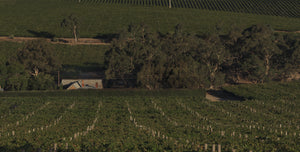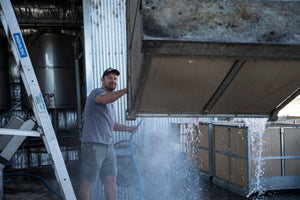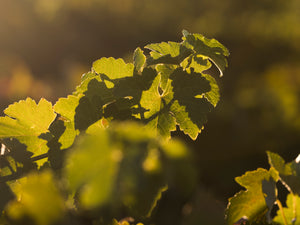Our Home
At the heart of everything we do is a commitment to nurturing our home and the land we care for. We believe in managing our vineyards sustainably, striving to enhance the environmental quality of our estate. By improving biodiversity and fostering healthy soils and ecosystems—supported by our insectarium and native vegetation—we aim to create a thriving environment for our vines. Across our two estate vineyards, we primarily use organic fertilisers, and from Autumn through late Winter, we welcome 400 sheep to graze on natural grasses, reducing tractor passes and gently tending to the landscape.
Our approach to managing pests, diseases, and weeds is rooted in respect for biodiversity and minimising environmental impact. We carefully apply sprays only when needed and at the right time, always aiming for balance and preservation. We’re actively trialling methods to eliminate the use of pesticides and herbicides. This is supported by our biodiverse approach to undervine and midrow management, undervine mowing, planting of insectariums, and timed grazing with our sheep
during the growing season.” As proud members of Sustainable Winegrowing Australia, we report all pest, disease, and weed control measures, ensuring transparency and accountability in our journey toward a greener future.
Emissions
After working with Edge Environment to calculate our carbon footprint, we’ve set an ambitious emissions reduction target aligned with the Science Based Targets initiative (SBTi). Guided by this framework, we’re committed to reducing our scope 1 and 2 emissions by 42% by 2030, supporting the Paris Agreement’s goal of limiting global warming to 1.5 degrees. We’re also dedicated to measuring, sharing, and actively reducing our scope 3 emissions, ensuring a comprehensive approach to sustainability.

Energy
Since installing solar panels in 2015, we’ve been generating approximately 25% of our energy needs on-site. In FY24, about 80% of our energy came from renewable sources. Looking ahead, we’re focused on achieving 100% renewable electricity by 2026 as part of our SBTi emissions reduction target.

Water
In the vineyard, we use soil moisture probes, mulch, and straw to enhance water retention. Rainwater harvested from our winery buildings supports our operations, while inert gas and steam are used in place of water whenever possible. We also prioritise reusing water where we can, and all winery wastewater is treated through aeration and settling before being repurposed for vineyard irrigation.

Waste Management
Our approach to waste management focuses on reducing, reusing, and recycling wherever possible.
All materials are reused or recycled where possible, including grape marc which is composted onsite, mixed with other organic matter and spread back out on the vineyard. We are reporting our waste generation through Sustainable Winegrowing Australia membership.
Sustainable Winegrowing Australia
At Hentley Farm, sustainability isn’t just a philosophy—it’s a promise. As a certified member of Sustainable Winegrowing Australia, we’re proud to be part of a national movement committed to protecting our land, supporting our community, and securing the future of Australian wine. We believe in leaving the world better than we found it, and that begins in the vineyard. Through considered practices, we aim to create wines that are not only expressive of place but also created with the wellbeing of people and the planet in mind. This collective program is more than accreditation, it’s a shared pathway to long-term excellence, ensuring that the wines we make today can be enjoyed for generations to come.


